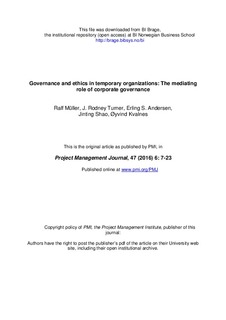| dc.contributor.author | Müller, Ralf | |
| dc.contributor.author | Turner, Rodney J. | |
| dc.contributor.author | Andersen, Erling S. | |
| dc.contributor.author | Shao, Jingting | |
| dc.contributor.author | Kvalnes, Øyvind | |
| dc.date.accessioned | 2016-12-01T07:16:00Z | |
| dc.date.accessioned | 2016-12-09T14:09:08Z | |
| dc.date.available | 2016-12-01T07:16:00Z | |
| dc.date.available | 2016-12-09T14:09:08Z | |
| dc.date.issued | 2016 | |
| dc.identifier.citation | Project Management Journal 2016, 47(6):7-23 | nb_NO |
| dc.identifier.issn | 8756-9728 | |
| dc.identifier.uri | http://hdl.handle.net/11250/2424814 | |
| dc.description | This is the original article as published by PMI | nb_NO |
| dc.description.abstract | The impact of multilevel level governance on the frequency of ethical issues in temporary organizations (TOs) is investigated. A structural equation model, based on a global survey, showed that behavior control, as a governance mechanism at the temporary organization (TO) level, reduces the frequency of ethical issues. This relationship is partly mediated through corporate governance, which controls ethical issues by following good governance principles. Using institutional and agency theory, we identify a substitution effect, where micro level (TO) governance substitutes for ‘holes’ in the macro level (corporate) governance. Situational contingencies for the synchronization of governance efforts across macro and micro levels are discussed. | nb_NO |
| dc.language.iso | eng | nb_NO |
| dc.publisher | PMI, Project Management Institute | nb_NO |
| dc.title | Governance and Ethics in Temporary Organizations: The Mediating Role of Corporate Governance | nb_NO |
| dc.type | Journal article | nb_NO |
| dc.type | Peer reviewed | nb_NO |
| dc.date.updated | 2016-12-01T07:16:00Z | |
| dc.source.pagenumber | 7-23 | nb_NO |
| dc.source.volume | 47 | nb_NO |
| dc.source.journal | Project Management Journal | nb_NO |
| dc.source.issue | 6 | nb_NO |
| dc.identifier.cristin | 1406856 | |
| dc.description.localcode | 1, Forlagsversjon | nb_NO |
